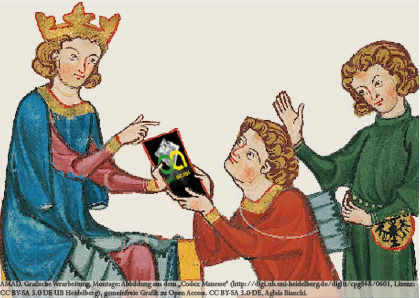AMAD
„Archivum Medii Aevi Digitale - Interdisziplinäres Open-Access-Fachrepositorium und Wissenschaftsblog für Mittelalterforschung‟Zur Einreichung

| Datum: | 2016 |
| Titel: | Ancient DNA Investigation of a Medieval German Cemetery Confirms Long-Term Stability of CCR5-∆32 Allele Frequencies in Central Europe |
| Autor*in: | Bouwman, Abigail Warinner, Christina Ruhli, Frank Akgul, Gulfirde Shved, Natallia |
| Beschreibung: | The CCR5-∆32 mutation present in European populations is among the most prominently debated cases of recent positive selection in humans. This allele, a 32-bp deletion (∆32) that renders the T-cell CCR5 receptor non-functional, has important epidemiological and public health significance, as homozygous carriers are resistant to several HIV strains. However, although the function of this allele in preventing HIV infection is now well described, its human evolutionary origin is poorly understood. Initial attempts to determine the emergence of the CCR5-∆32 allele pointed to selection during the 14th century Black Death pandemic; however, subsequent analyses suggest that the allele arose more than five thousand years ago, possibly through drift. Recently, three studies have identified populations pre-dating the 14th century CE that are positive for the CCR5-∆32 allele, supporting the claim for a more ancient origin. However, these studies also suggest poorly understood regional differences in the recent evolutionary history of the CCR5-∆32 allele. Here a new hydrolysis probe-based Real-Time PCR assay was designed to ascertain CCR5 allele frequency in 53 individuals from a 10th-12th century CE church and convent complex in central Germany that predates outbreaks of the Black Death pandemic. High confidence genotypes were obtained for 32 individuals, and the results of the study show that CCR5-∆32 allele frequency has remained unchanged in this region of Central Europe over the last millennium, suggesting that there has been no strong positive selective pressure over this time period and confirming a more ancient origin for the allele. |
| URI: | https://www.amad.org/jspui/handle/123456789/58324 |
| Quelle: | https://digitalcommons.wayne.edu/cgi/viewcontent.cgi?article=1117&context=humbiol_preprints https://digitalcommons.wayne.edu/humbiol_preprints/118 |
| AMAD ID: | 579355 |
| Enthalten in den Sammlungen: | BASE (Bielefeld Academic Search Engine) General history of Europe |

